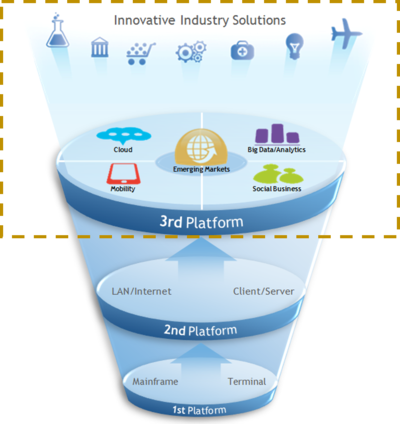I recently spoke with Crawford Del Prete, Executive Vice President of Worldwide Products and Chief Research Officer at IDC about digital business transformation and the importance of the Third Platform. Del Prete describes the Third Platform as IT that is built on mobile devices, cloud services, social networks and big data analytics. The First Platform, of course, is the mainframe computer system, which began in the 1950s and continues today. The Second Platform is the client-server system, which began in the 1980s with PCs tapping into mainframe databases and applications. Del Prete believes that the Third Platform is transforming the technology industry as companies start to innovate and accelerate the adoption of mobile, social, cloud, data and application technologies.

Crawford Del Prete (Twitter: @Craw), Chief Research Officer - IDC
With billions of devices connecting together and hundreds and millions of apps, Del Prete says that the Third Platform will change the world and provide the basis for how the world will move to the Internet of things (IoT). "Experience around every aspect of life will be transformed," says Del Prete who is "super excited" about the Third Platform, and says that he is seeing it evolve more quickly then he thought.
Del Prete's advises CIOs and technology leaders on the importance of the Third Platform and IT and business success factors:
1. Third Platform will drive sustainable business growth - According to Del Prete, when you look at Second Platform growth verses the growth of the Third Platform, the Second Platform will be dead flat to slightly declining by 2018 and technology associated with the Third Platform will experience anywhere between 15-17% compounded annual growth. "If you are a company that was not born on the Third Platform, you better get there. If you are a company that is not delivering 3rd platform technology, your market is flat or declining," says Del Prete. IDC's top 10 technology predictions for 2014 are all based on battles for dominance and survival on the 3rd Platform, the theme of this IDC report.
2. The birth of cognitive platforms - Transformation is everywhere as a result of the Third Platform, fueled by the connections of everything, everywhere. The Internet of things (IoT) promises to be game changer for almost every major IT vendor, as 30 billion autonomously connected endpoints will be built and $8.9 trillion in revenue will pour into the sector by 2020. Companies will be faced not only with connecting all of the devices that will be out there, but also with dealing with the emergence of new technology. "Companies will need to look at how they mash up the four big trends (social, mobile, cloud computing and big data) into next generation cognitive platforms," says Del Prete, who says the future of IT is moving from correlation to prediction and creating solutions that fit consumer needs. "By 2020, we believe that the combination of the Third Platform and cognitive computing can reduce the number of knowledge workers by as much as 15%," says Del Prete.
3. Digital adoption will require stronger IT and business collaboration - For companies to drive digital transformation and adoption of the Third Platform, they must come to realize that it's not about technology, but business factors and people. The impact of technology needs to be seen as the enabling platform and as taking place at the intersection of technology transformation and business transformation. IDC research shows that 61% of technology spend is influenced or directly spent by lines of business. 17% of this number is pure shadow IT - where IT is not involved at all. The most forward thinking companies are those that really understand that the CIO and CMO offices need to collaborate to figure out what technology to spend on.
4. CIOs will play a pivotal role in driving digital business transformation - CIOs must focus on innovation or die. The CIOs who understand the Third Platform are focused on partnering with the lines of business to really drive innovation and figure out ways to engage customers in new revenue streams will have a seat at the table. "As a result of the transformation of the industry, CIOs need to be focused on innovating in a new way or they will die," says Del Prete, who doesn't buy into the notion that the CIO will only exist as the procurer of services. "Sure, part of the job of the CIO is a broker of services, but the CIO also needs to be technologically astute and understand what the company can do with the tools they have on hand and how they can evolve the tools to move to the future in a faster way than ever before", he says. CIOs also need to recognize that marketing organizations will spend 50% of their program budget on digital initiatives by 2016.
Del Prete shares that fact that his CIO at IDC is the co-chair for his research group. As his partner, the CIO can give him the green light for building or tell him what the risks and costs are. Del Prete says that this tight partnership helps maintain innovation going forward.
5. The CMO or the CDO is the CIOs best friend - The CIO has to become the place where the company can go and rely on the CIOs understanding of what is possible in the construct of what the company does and what tools the company has. The chief digital office (CDO) or the CMO is at the tip of that arrow saying "here are the innovative tools we could be using to create new offerings, engage customers, transform the buying experience, etc." and the CIO has to be able to come back and say "here is our current data structure and how I can partner with you to make your vision a reality". Del Prete feels that partnering with the CDO is essential for CIOs and he says that he doesn't see enough companies focused on the idea of a CDO. CIOs should seriously consider the CDO as potentially the most important new hire into the IT organization, advice from a digital business and technology industry expert Dion Hinchcliffe.
6. The empowerment of the consumer will drive new technology - As the Chief Research Officer for IDC, Del Prete has a unique vantage point sitting at the forefront of up and coming technology. He says that the empowerment of the consumer is a ship that has sailed. The future of IT will be about giving people the tools to make them successful - evolving to augmented reality, prescriptive marketing, artificial intelligence, and all sorts of fascinating sets of technology that will assist them in their everyday lives. IDC believes that wearable devices will be a high growth space and that by 2020, 30% of the market for wearables could be one time disposables for security and health-related issues. IDC thinks that the big areas ripe for transformation will be retail, health and financial services. According to Del Prete, "In the end we will see a very different world that is consumer empowered and it will come faster than anyone can believe."
You can watch the full interview with Crawford Del Prete here. Please join me and Michael Krigsman every Friday at 3PM EST as we host CXOTalk - connecting with thought leaders and innovative executives who are pushing the boundaries within their companies and their fields.

